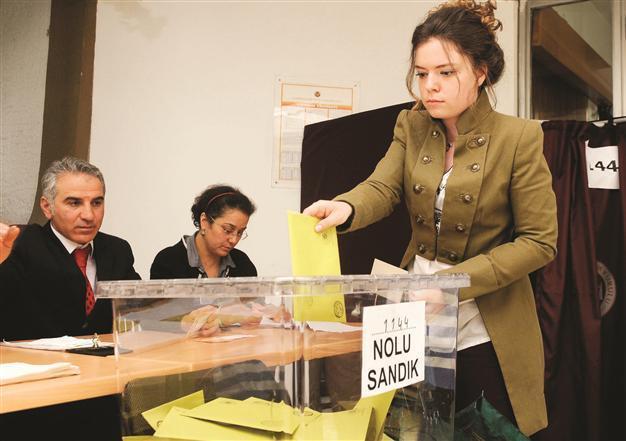Turkish government mulls changes to electoral system
ANKARA – Hürriyet Daily News

There is currently a 10 percent election threshold in Turkey, which might be lowered along with significant changes to the current electoral system. AA photo
A change in the electoral system and a lowering of the election threshold have been cited among possible surprising elements of the upcoming “democratization package,” which Prime Minister Recep Tayyip Erdoğan will personally announce on Sept. 30. However, at the moment the former seems more likely than the latter.
The ruling Justice and Development Party (AKP) is reportedly planning to introduce a narrowed constituency system as part of the so-called package, composed of a set of reforms expected to meet certain demands of the country’s Kurdish people. The possible reforms are seen as part of the ongoing resolution process aimed at ending the three-decade long conflict between security forces and the outlawed Kurdistan Workers’ Party (PKK).
The AKP anticipates that such an electoral system will be in its favor. In fact, the mooted system was used in the 1987 elections by former Prime Minister Turgut Özal and favored the ruling party at the time.
In the system, five or six deputies will be elected from each constituency, with Istanbul composed of 18 to 20 constituencies, Ankara of six, and İzmir of four.
Such a system would result in considerable advantages for the two parties that received the highest votes in the constituency. In metropolitan cities, it is expected to work in favor of the ruling AKP, while in eastern and southeastern provinces, both the AKP and the Peace and Democracy Party (BDP) would be expected to gain from the system.
If this system is implemented, it is estimated that the main opposition Republican People’s Party (CHP) may increase number of is deputies in some cities, while the number of its deputies may decrease in other cities.
For the Nationalist Movement Party (MHP), the results would likely be completely negative.
For the AKP to be able to use this system in the upcoming June 2015 parliamentary elections, in line with the Constitution, the Parliament would have to adopt a related law by June 2014 at the latest.
This constitutional obligation raises the chances that this change will be included within the upcoming democratization package.
Both an electoral system change and a lowering of the election threshold are considered to be closely related with the fate of the peace process.
Accordingly, the package may include an amendment that would allow financial aid from the Treasury to be granted to all political parties that get three percent and more of the vote. Still, such an amendment would likely depend upon the prospects of a change in the election threshold level, which at the moment stands at 10 percent.
Threshold awaits PM’s announcement
In the last two parliamentary elections, the pro-Kurdish BDP submitted independent candidates in order to avoid the condition of having to win at least 10 percent of the national vote to receive a legislative seat, and then gathered under the roof of the BDP in Parliament.
The internal debate within the AKP regarding the electoral threshold has yet to be fully resolved, with one side arguing that an amendment lowering the threshold may refresh the stalled peace process, while the other side arguing that it should remain as it is to maintain stability and to avoid a shift of votes from the AKP to the BDP. So far, Erdoğan himself has appeared firmly against such a change, saying that it could lead to the forming of unstable coalition governments.
AKP may use panel’s work
The poor performance of the Constitution Conciliation Commission has led to pessimism, raising question marks as to whether the Commission will eventually be dissolved without being able to draft a full Constitution. The three opposition parties seem determined not to be the one to leave the table first.
For the AKP, one option is to increase the number of articles that have been drafted with a consensus - most of them related to fundamental rights and freedoms - and taking a constitutional amendment package formed of these draft articles to Parliament by the New Year. Such an option could work as a propaganda tool for the AKP in the March 2014 local elections. The AKP may also like give a break from the New Year until after the local elections.
